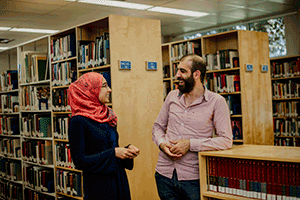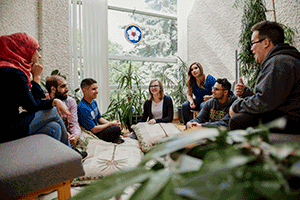Ready to learn more?
Get all the details straight to your inbox!

Free enrolment counselling support and invaluable one-on-one academic advising are available for all programs at Luther College.

Luther College offers Bundles programs that group together first-year students and classes to give you a great start and help ease the transition from high school to university.

Luther students can register in Arts, Science, or Media, Art, and Performance. Luther students are U of R students and receive a U of R degree.

To enrol as a Luther College student, simply fill out the University of Regina application form and select Luther as your campus of choice.

The Luther Library has over 24,000 items in its collection, 5,000 books checked out per year, and 7,000 students who come through its door per month.

Luther College appeals to students who want to study in a safe, nurturing, and inclusive environment. We welcome students of all faiths, ethnicities, backgrounds, religions, genders, and sexual orientations.

Luther College is recognized for its high standards of teaching, focused research, and one-on-one academic advising. We value and protect this heritage of excellence in scholarship, freedom of inquiry, and faithful seeking after truth.

Luther College students are eligible for nearly $100,000 in academic awards – in addition to scholarships and bursaries awarded by the U of R.
Get all the details straight to your inbox!
By Benjamin Fiore, SJ
In her call to reinvent liberal arts education, Professor Coleman sees the professionalization of the liberal arts instruction and the emphasis on developing technical competence instead of a value system as detrimental to the civic engagement of our students in advancing the public good. Seeing a threat from fundamentalisms and theocratic absolutism, she calls for a revisioning of liberal arts education in a secular context. What she ends up with is an “action oriented” curriculum with input from artists, social activists and other public actors supplementing the traditional academy. To achieve the values of justice, unity and truth she proposes rhetoric, quantitative reasoning and a politics of principle to develop a flexibility of the mind and a multiplicity of perspectives.
The current restructuring of the core courses required for a bachelor’s degree in the Faculty of Arts and Sciences at the University of Regina, which echoes similar changes throughout Canada and the USA, recognizes and tries to deal with the observations about liberal arts education in Prof. Coleman’s statement. The academic specialization of the professors had led to a core which was largely a selection of disparate courses that reflected the professors’ individual expertise and research interests rather than a coherent understanding of what should constitute a liberal arts education. The courses were arranged in two columns of generally related subjects (list A-humanities and list B-social sciences). Sciences and Fine Arts, also required, were listed separately. To salvage something from this situation the new core includes only introductory level courses which approach subject areas most broadly and thereby acquaint the students with a body of knowledge and a taste of the methodologies appropriate to each discipline. What’s more, the core also groups the course options according to competencies rather than subject matter. In this way, the core hopes to retain what had long been held to be one of the chief aims of a liberal arts education, that is to develop the students’ capacity for critical thinking and analysis, for clear and effective expression in writing and speech whether in their own or in another language, for awareness of world culture and of the human personal dynamic, and for the scientific method. This is an imperfect solution to the problem Prof. Coleman alludes to, but it promises to preserve the heart of liberal arts education in the near future as it prepares students to take an active and effective role in society.
Prof. Coleman sees the problem as the replacement of the “educated generalist” with the “expert” and a betrayal of the principles of decency and hope, fundamental to the public good. The solution she introduced at Bennington College dealt with strategies to orient the students toward public activism. The symbol of her curriculum reform is the “secular church” featured on the college’s “holiday card” in which the revisioning activity is centered. I suggest that her solution underlines an even more fundamental shift at the root of the decline of liberal arts education, namely, the retreat from the transcendent as a legitimate goal of intellectual striving. Theology, once the “queen of the sciences” is totally discredited in our university as a valid academic pursuit. What replaced it is an anemic survey of world religions where the phenomena related to belief are observed with little sympathy for the transcendent goal that lies behind the belief itself. Philosophy, the second pillar of the liberal arts, has become epistemological word games which –presuppose a fundamental skepticism about knowing anything beyond the individual’s own act of knowing. Knowing the truth is not a goal; metaphysics and the knowledge of reality beyond appearance are abandoned. Skepticism and relativism is what one is left with. Ethics is rarely considered apart from what is legal, in business, what accords with the claims of individual and groups rights in society, and what works politically in the national and international order. The underpinnings of value that stem from the human person are relegated to the area of “religion” and shunted to the margins of consideration. Science is elevated to a place of primacy, where alone solutions to human problems and valid answers to fundamental questions can be discovered. This obsession ignores the fact that science, without the guidance of a system of values, has produced massive dislocations and destruction in our time.
The damage to “civic engagement” which Prof. Coleman laments results from this skepticism and self-absorption, whether of the “expert” or even of the “generalist.” The very presuppositions and prejudices of both the expert and the generalist merit reconsideration in order to recapture the grounding of liberal arts education for the well being of the students and their life in society. Prof. Coleman thus tinkers at the edges of a problem which her approach to education continues and strengthens.